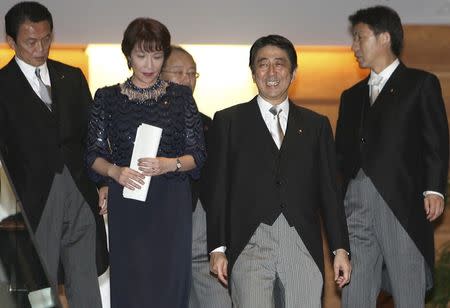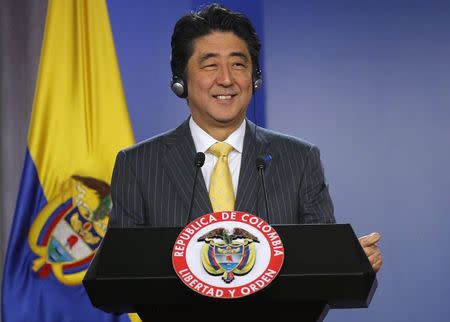Japan's Abe eyes more women in cabinet; ministers may struggle to make mark
By Linda Sieg TOKYO (Reuters) - Japanese Prime Minister Shinzo Abe is likely to boost the number of female ministers when he reshuffles his cabinet next week in a show of commitment to promoting women, but the appointees may struggle to convince skeptics they are more than tokens. Abe has made a push to get more women into the workforce to fill gaps due to an aging, shrinking population a linchpin of his "Abenomics" growth plan. His growth strategy, unveiled in June, set a target of raising the proportion of women corporate managers to 30 percent by 2020 from 7.5 percent last year. Now he is under pressure to match words with action on the political front. Wooing women voters could also help Abe's overall ratings. The prime minister saw his popularity dented more among women than men after easing the limits of Japan's pacifist constitution on the military in July, although his overall support rates have since rebounded to around 50 percent. Abe needs to appoint women to at least five of 18 ministerial posts to make 30 percent of his cabinet female. That would equal the record for women in maverick Junichiro Koizumi's 2001 cabinet. There are now two women in the cabinet. But with key portfolios such as chief cabinet secretary, economics and finance unlikely to change hands, women as well as many male appointees may have trouble making a mark on policies. "Power is concentrated in the prime minister and offices such as the chief cabinet secretary. It will be just token, and men will also be token," said Sophia University political science professor Mari Miura. Abe has not revamped his cabinet since returning to office in December 2012, a record for a post-World War Two premier. That means dozens of veterans in his male-dominated Liberal Democratic Party (LDP) are hoping to be tapped for a post when the new line-up is unveiled next Wednesday. SENDING A SIGNAL Abe will be drawing from a small pool of women in the LDP, where women hold only 40 of its 418 seats in parliament. The number shrinks to 11 if he applies the unwritten rule that candidates should have served at least four lower house terms or three in the upper chamber. Breaking that rule of thumb could leave Abe open to charges he favored gender over experience. "I am against a quota system. I want (candidates) to be judged fairly. But being female shouldn't be a negative factor," LDP policy chief Sanae Takaichi told Reuters. A former minister for gender equality in Abe's first cabinet in 2006, Takaichi is one of several women whose names have been floated by media for portfolios. Abe will also have to balance a penchant for picking allies who share his views with a need to look inclusive, experts said. Many of those seen as possible candidates share Abe's conservative agenda including promoting traditional family values and a less apologetic view of Japan's wartime past. Others such as Yuko Obuchi, the daughter of a former prime minister and a mother of two who was the first cabinet minister to serve while pregnant, are from a more moderate wing of the LDP. Women in past Japanese cabinets have tended to be awarded less powerful portfolios and in rare cases where they won key posts, faced problems when they tried to exercise their clout. Makiko Tanaka, the outspoken daughter of a former premier, became Japan's first female foreign minister in 2001, only to be sacked months later over a feud with a top ministry bureaucrat. Yuriko Koike, who became Japan's first female defense minister during Abe's 2006-2007 term, was replaced after less than two months after clashing with the ministry's top career bureaucrat - who was later convicted of accepting bribes. Still, some experts said giving more women posts could send a positive message in Japan, which ranked 127th in terms of the percentage of female lawmakers, according to a U.N. survey. "While appointing women to the cabinet is no panacea, at the minimum, a positive 'signal effect' can be created," said Kathy Matsui, chief Japan strategist at Goldman Sachs. "However, appointing women is the easy part," she added. "For women to truly be effective, the prime minister and senior LDP leadership will have to take ownership and invest in their success." (Editing by Robert Birsel)


